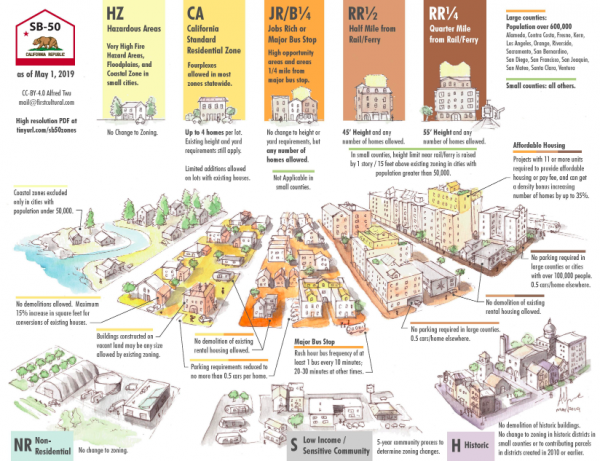
A controversial bill that would have allowed construction of more housing near mass transit locations and in single-family home neighborhoods won’t come up for a vote by the state Senate’s Appropriations Committee until January 2020.
Senate Bill 50, introduced by Sen. Scott Wiener (D-San Francisco), would permit construction of four- to five-story apartment complexes near rail stations and ferry stops. It also would have allowed the division of existing single family homes into four separate units.
SB 50 was opposed by a number of local governments, including the West Hollywood City Council, the Beverly Hills City Council and the Los Angeles City Council, each of which argued that the bill would unfairly reduce their control of local development. It also was opposed by local homeowner associations in West Hollywood.
Local governments expressed concern that permitting such development could mean the displacement of housing for low-income residents. West Hollywood’s rent stabilization law sets a limit on rent increases for apartment buildings that received their original certificate of occupancy before July 1, 1979. However, landlords can increase rents to market levels when a tenant moves out. And the state Ellis Act allows a property owner to evict tenants if he intends to remove the property from the rental market.
Another argument against the bill is that it would have altered the suburban nature of most California neighborhoods.
Wiener’s bill was intended to address the housing crisis in California, where strong local opposition to new development has resulted in a major shortage of housing that has forced prices up and contributed to the state’s homeless crisis. Zillow, the housing website, has reported that median home prices in California are $548,000, two and a half times the national average. Another goal was to reduce greenhouse gas emissions by encouraging development near rapid transit stops. The recently released American Lung Association annual “State of the Air” report, which covers the years 2015-2017, ranks Los Angeles as the nation’s “smoggiest city,” a rank it has held for 19 of the past 20 years. It ranks No. 5 among the nation’s “sootiest cities,” a category in which the Fresno area ranks No. 1.
SB 50 was Wiener’s second effort to increase development near transit areas. The first effort also failed to be released from a committee for consideration by the state legislature. Wiener revised SB 50 to gain support from some fellow legislators, largely those in smaller coastal counties whose populations of 600,000 or less.
Gov. Gavin Newsom said that he was disappointed that Wiener’s bill wasn’t allowed to move to the legislative floor for a vote.
“Developing housing around transit must also be part of the solution, and today’s developments can’t end or stall that critical conversation,” Newsom said.
“We’re not giving up trying to move it forward this year,” Wiener said. “This is not over … We’re either serious about solving this crisis, or we aren’t. At some point, we will need to make the hard political choices necessary for California to have a bright housing future.”

The solution is to build high density in “downtown” type areas, not spread it out so that there’s no respite from development. Why does Los Angeles (and other places) resist being a real city with a real downtown core? Build all you want downtown where there is already high density, but all these bills do is pour money into a trough from which developers like pigs gorge.
[…] went on to explain how a bill to expand affordable housing failed to move forward despite support from “a diverse coalition of business and advocacy […]
I’m glad. It would cause rezonjng and bad move all around.
Now I regret my words. We need to do something about rising costs. It effects all of us.
It would be nice if at least SOME respite was happening from all the CURRENT development going on. But the EXACT OPPOSITE is what happens. Development = HIGHER housing costs not less. It is time we looked at this entire issue as a whole including why we need so much additional housing in the first place. Just how much are residents having to foot the bill so that businesses can hire cheap labor?